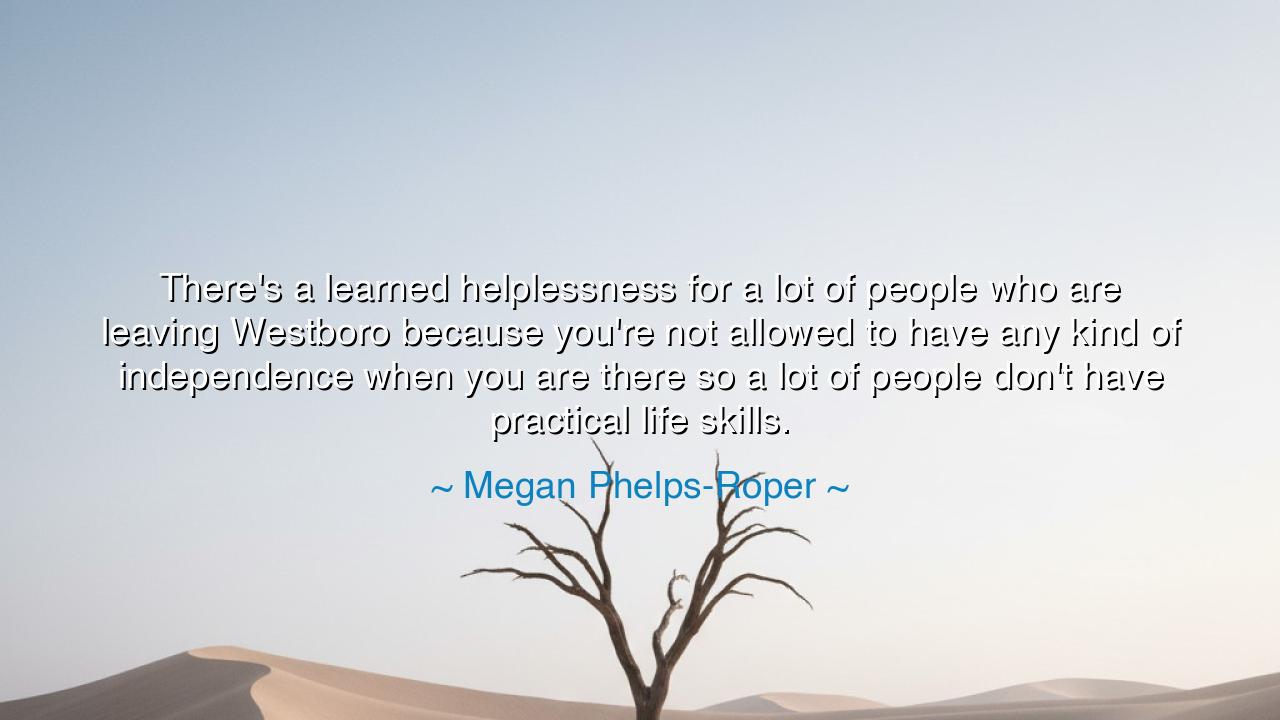
There's a learned helplessness for a lot of people who are
There's a learned helplessness for a lot of people who are leaving Westboro because you're not allowed to have any kind of independence when you are there so a lot of people don't have practical life skills.






“There’s a learned helplessness for a lot of people who are leaving Westboro because you’re not allowed to have any kind of independence when you are there, so a lot of people don’t have practical life skills.” Thus spoke Megan Phelps-Roper, a woman who journeyed from darkness into light — from the confines of dogma to the open air of compassion. Her words bear the weight of both experience and revelation. They speak of freedom lost and regained, of the mind’s power to shape its own prison, and of the long road that must be walked when one learns to be free again. In her reflection lies a lesson for all generations: that independence — of thought, of heart, of spirit — is not merely a right, but a skill that must be nurtured, protected, and reclaimed when stolen.
To understand her meaning, one must know the world she escaped. Westboro Baptist Church, infamous for its hatred and isolation, was not merely a religious sect — it was a fortress built of fear and control. Within its walls, every thought was regulated, every relationship filtered through ideology, every act of kindness twisted into a weapon of division. In such a place, individuality was not simply discouraged; it was forbidden. Those who questioned, even in silence, felt the weight of exile pressing upon their souls. And so, as Phelps-Roper reveals, the members learned helplessness — the kind that is not born of weakness, but of conditioning. When one’s will is denied again and again, the very idea of choice becomes foreign, and the mind forgets how to trust itself.
This learned helplessness, she explains, follows those who leave such a world. It is not only the absence of belief, but the absence of confidence — the inability to act without authority, to decide without permission. Those who escape must learn again the simplest things: how to speak without fear, how to choose without guilt, how to live without asking if they are allowed. The chains that bound them are no longer visible, but they remain heavy upon the heart. Freedom, then, is not a door one steps through, but a journey one learns to walk — trembling at first, then boldly, as the soul remembers its own strength.
The ancients knew this truth well. When the slaves of Egypt followed Moses into the wilderness, they found that liberation was not the end of their suffering but the beginning of their transformation. For years they had obeyed the lash, and though their bodies were free, their spirits still longed for the structure of their bondage. “Would it not have been better to die in Egypt?” they cried, forgetting that freedom demands courage, and courage demands faith. So it is with those who leave any tyranny of the mind — whether it be a cult, a dogma, or a habit of fear. The hardest chains to break are the ones we no longer see.
Phelps-Roper’s words are not only about religion — they are about the human condition. Each of us, in some measure, faces our own forms of learned helplessness. We grow accustomed to the voices that tell us who we are, what we can do, what we must fear. When the world grows too loud with judgment or expectation, we may forget the quiet voice within — the one that says, I can choose. And so, like those who left Westboro, we too must learn again the art of independence: the discipline of thinking for ourselves, the courage to act without approval, the grace to forgive ourselves when we falter.
Consider how Megan Phelps-Roper herself became the living answer to her own pain. Once a fierce defender of her church’s cruelty, she began to question her beliefs when she was met not with hatred, but with empathy — when strangers, instead of condemning her, spoke to her with patience and love. In time, the compassion of others unlocked the compassion within her, and she walked away from Westboro to begin anew. Her journey was not swift, nor without sorrow. She stumbled often, learning how to navigate a world she had been taught to despise. Yet through that struggle, she found the truest kind of freedom — the freedom that comes from self-knowledge and humility.
The lesson, then, is as ancient as it is urgent: freedom must be practiced. It is not enough to escape our prisons; we must also unlearn our dependence upon them. Whether those prisons are built of fear, ideology, or comfort, we must train our minds to stand firm and our hearts to trust their own light. Help those who are still trapped in darkness, not with scorn but with understanding, for empathy is the hand that guides others out of despair. And when you feel helpless yourself, remember that even the faintest spark of choice — a single act of courage — is the beginning of renewal.
So, my child of awakening, let this truth dwell within you: independence is not given; it is cultivated. The world will always have those who seek to rule by fear, to make others doubt their worth. But you must remember what Phelps-Roper learned — that your will, once reclaimed, is sacred. Tend it. Strengthen it. Use it to build bridges, not walls. For the mark of true freedom is not rebellion for its own sake, but the wisdom to live with both strength and compassion, unafraid to think, unafraid to love, unafraid to be.






AAdministratorAdministrator
Welcome, honored guests. Please leave a comment, we will respond soon